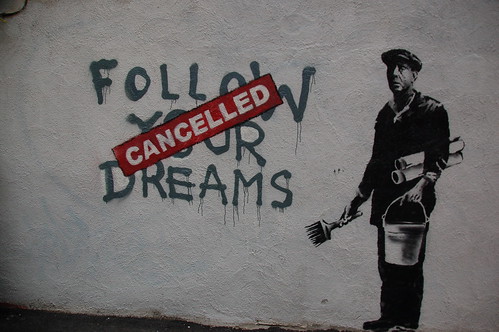
Lately something has been bothering me – why are smart people so dumb? What is it with the focus on careers, working 60, 70, 80 hour weeks for money they don’t need? Don’t they realize money is worthless without the time to spend it? Don’t they realize the opportunity cost? Life is passing them by, yet it is often enjoyed by dumber people with less money!
If they are so smart, they should simply figure out what will make them happy and their life a success. Instead, the smartest of the smart receive an elite education and quickly get funneled into jobs with vague titles like “consultant”, “investor”, or “capitalist”. They receive promotions, make buttloads of money, and surround themselves with luxuries. These people fall into two categories: those that justify their behavior and those that don’t think about it.
Justify
Some people are happy working 80 hours a week and truly believe it is what they want. To them I say – show me just one person on his death bed that wishes he had spent more time in the office. Even those who did very meaningful work, helping others, providing for a family, realize just how valuable that time is when it is gone. There is more to life.
Some people try to front load their careers, thinking, if I can just last in this job until I’m 35, I’ll have enough money to be set for life. That is a slippery slope and quite a sacrifice. If you don’t walk away when you are on the bottom, what makes you think you’ll walk away when you are on top, making even more per year? After sacrificing your youth and damaging countless relationships, how enjoyable will your retirement be?
Even worse is the feeling of entitlement – “I have worked hard my entire life and I’m incredibly smart. I deserve to make $150k, drive a BMW, and be the envy of my neighbors.” Ew. You are not entitled to anything, I’m sure there are others that work just as hard at the bottom of the totem pole. Quit justifying your lavish behavior and start appreciating the fact that the best things in life are free.
Don’t Think
I believe most smart people don’t think about happiness and the definition of a successful life. They just put their head down and devote the majority of their time to kicking ass at their job – have they even thought about what is at the end of that road? Is it really what they want?
These are important questions, but they are rarely even considered. Why does this happen? The people that go to elite universities are overachievers. They grew up smarter than their peers and likely dominated in a number of other areas. For whatever reason, they love to win, and their career is the most obvious way to dominate in adult life.
When people who have a high need for achievement … have an extra half hour of time or an extra ounce of energy, they’ll unconsciously allocate it to activities that yield the most tangible accomplishments. And our careers provide the most concrete evidence that we’re moving forward. You ship a product, finish a design, complete a presentation, close a sale, teach a class, publish a paper, get paid, get promoted. In contrast, investing time and energy in your relationship with your spouse and children typically doesn’t offer that same immediate sense of achievement. Kids misbehave every day. It’s really not until 20 years down the road that you can put your hands on your hips and say, “I raised a good son or a good daughter.†You can neglect your relationship with your spouse, and on a day-to-day basis, it doesn’t seem as if things are deteriorating. People who are driven to excel have this unconscious propensity to underinvest in their families and overinvest in their careers—even though intimate and loving relationships with their families are the most powerful and enduring source of happiness.
Harvard Business Review – How Will You Measure Your Life
The tradeoffs are very subtle. Bob Barker is not going to present you with two Showcase Showdowns and ask which one you want. It’s a gradual process built up by hundreds of daily micro-decisions stacked up over years. In fact, no individual decision is even multiple choice. Smart people prove to be just as capable at ignoring the innumerable options as dumb people.
Social Pressures
If only it were as easy as identifying all the possible choices and making the correct decision – there are external pressures in play as well. Many smart people spend the first quarter of their life in school, showing exactly how awesome they are. An elite education provides the opportunity for a wonderful career, something largely beyond the grasp of the general populace. In fact, not only do you have this opportunity, it is expected of you to capitalize on it. The majority of your drinking buddies from school move on to big things in the working world, providing a comparison pressure. You don’t want to let down the family that sacrificed to give you the opportunity. Many high school friends, and all those less fortunate, would kill to be in your position, how can you throw that away? It’s a good thing most of them will never have to grapple with these questions!
A Less Fulfilling Life
These forces add up and result in a less than fulfilling life for many of the smartest people in our great country. It is a shame. They take the sure thing (career), misallocate their time, and don’t consider the other options. But I don’t blame them. If you knew you can make over $100k per year just by putting in the time, had everything your heart could desire, and were the envy of those around you, would you turn that down on the off chance that you could look back on your life and deem it time well spent?
Photo: Street art by Bansky. Picture by Chris Devers











